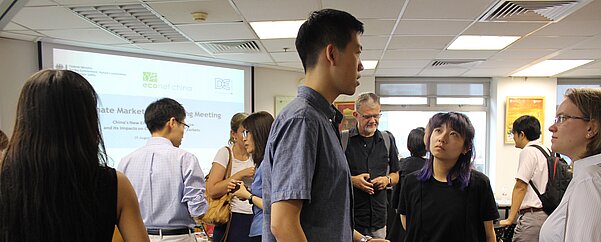
August 2018 - China established its new Ministry of Ecology and Environment (MEE) back in March this year. The MEE assumes key climate change mitigation and emission reduction responsibilities which were previously under the mandate assigned to the National Development and Reform Commission (NDRC). It remains to be seen, however, whether the new ministry will be in a position to tackle the challenges faced in mitigating climate change, reducing emissions and operating the country’s recently-introduced emissions trading scheme (ETS). Against this backdrop, the AHK Greater China Beijing invited some 30 industry representatives and experts to a networking meeting held on 29 August.
At the event, which was held as part of the Climate Markets Cooperation project funded by the German Federal Ministry for the Environment, Nature Conservation and Nuclear Safety (BMU), two specially selected experts gave an insight into the new roles to be played by the Chinese Environment Ministry (MEE) and their implications in respect of climate change policy and carbon markets.
Looking at China’s climate change policy, Li Shuo, Senior Global Policy Advisor at Greenpeace East Asia, believes it provides for a good deal of policy consistency because many of the key individuals who were responsible for climate-related issues at the NDRC have moved to the MEE. Nonetheless, some observers have expressed concerns that the MEE could act with more restraint and reserve when compared with the NDRC.
Wang Shu, former Deputy Director of the Climate Change Department at the NDRC, outlined the challenges and opportunities arising from the expansion the MEE’s scope of responsibility to take in issues relating to climate change. He cited, for example, the expertise in relation to market-based instruments that the MEE currently lacks and must first acquire in order to implement climate policy measures. In the longer term, he said, this could provide an opportunity to link the role of the national ETS with a future conceivable carbon tax.
A detailed report on the networking meeting is contained in the August issue of Econet Monitor, a magazine published by AHK Greater China in Beijing. The article can be downloaded here.
Note: The publication is available only in German.
Cookie Settings
Marketing-Cookies werden von Drittanbietern oder Publishern verwendet, um personalisierte Werbung anzuzeigen. Sie tun dies, indem sie Besucher über Websites hinweg verfolgen.
Provider:
Statistik Cookies
Statistik-Cookies dienen der Analyse und helfen uns dabei zu verstehen, wie Besucher mit unserer Website interagieren, indem Informationen anonymisiert gesammelt werden. Auf Basis dieser Informationen können wir unsere Website für Sie weiter verbessern und optimieren.
Provider:
Erforderliche Cookies
Erforderliche Cookies sind für den reibungslosen Betrieb der Website zuständig, indem sie Kernfunktionalitäten ermöglichen, ohne die unsere Website nicht richtig funktioniert. Diese Cookies können nur über Ihre Browser-Einstellungen deaktiviert werden.
Provider: